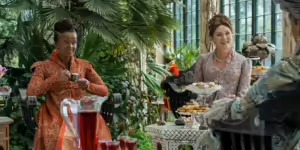
‘Queen Charlotte’ dives straight into the gritty and messy reality of relationships.
Both Bridgerton and its spinoff Queen Charlotte: A Bridgerton Story indulge in the exploration of love and marriage and all the complexities that come with them. Bridgerton has revolved around three separate couples to date whose love story dominates their respective seasons. Their love stories are almost predestined: perfect star-crossed lovers who will tackle any obstacle in their path in order to be with each other, and in both cases the primary obstacles are themselves.
However, Queen Charlotte features three different stories that essentially represent the antithesis of what love traditionally looks like. There’s a lack of choice, of free-spirited happiness that is so prominent in Bridgerton’s couples. But more importantly, Queen Charlotte embraces the diversity of relationships and how love doesn’t need to fit a strict code to still ring true.
‘Queen Charlotte’ Has a Messy Enemies-to-Lovers Arc
Bridgerton has explored the “enemies-to-lovers” trope in Season 2, where the main couple has their love blossom out of the ashes of mutual loathing. The show depicts the “lovers” part as inevitable, causing an undeniable pull and chemistry between two attractive protagonists that they try and fail to fight against. It’s a little bit more complicated in Queen Charlotte. Throughout the series, the younger Queen Charlotte, played by India Amarteifio, deals with the complexities of her marriage while her older counterpart, played by Golda Rosheuvel, barely sees her husband. The couple certainly has a clear enemies-to-lovers arc, but it isn’t an omniscient power that draws them together; instead, it is choice. Wed as total strangers, they aren’t given a chance for a premarital whirlwind romance as the Bridgerton couples do, apart from a brief meet-cute as Charlotte tries to escape the wedding.

The two only really get to know each other after the wedding and, with careful secrets being revealed, the pressure on their relationship is suffocating. The only way for them to survive the responsibilities of the crown and King George III’s (Corey Mylchreest) mental health condition is to choose to love each other. We particularly see this in Charlotte, who simmers in resentment throughout more than half the show before she obstinately decides to hurry to Kew and support the King. She chooses to love because not doing so will threaten the monarchy and herself; it’s almost an act of self-preservation. This choice distinguishes them from the Bridgerton couples. Although the other pairs have their choices of a partner limited to the ton, they still have a choice of whom they were to marry, whether it be an undeniable love connection or a more strategic one. Charlotte, however, doesn’t have a choice of a partner — it is either marry George or don’t — and when she does, her only viable choice is to love George, because the other option is inconceivable.
Just because it seems the last resort doesn’t mean their love isn’t love. Borne out of trials and tribulations, Queen Charlotte’s choice to love the King is simply another form of love. Despite her instinct for survival, she truly wants George to succeed, becoming his primary support system and devoting her life to his care and reign. And this love rewards her as well, as we see their intimate moments of happiness among the despair. The show solidifies their love in the final scene of the show, where Charlotte recreates one of her moments with George and lays underneath the bed, inviting him to “hide from the heavens” with her. This bittersweet moment encapsulates the hardships and triumphs of their marriage — all because Charlotte “did not go over the wall” and chose to love instead.
Lady Danbury Begins to Love Herself in ‘Queen Charlotte’
Portrayed by Arsema Thomas, young Lady Danbury most definitely has the most brutal marriage out of the three women. Subjected to years of marital sexual assault, traditional methods of avoidance, and having all her achievements stolen, Lady Danbury is ecstatic when her husband comically and reconciled passes away in the middle of intercourse. Their entire marriage is in complete opposition to Bridgerton’s love and love in general. Yet Lady Danbury’s romantic storyline doesn’t end there; During her period of mourning, she engages in an illicit affair with a married man, Lord Ledger (Keir Charles), who also happens to be Lady Violet Bridgerton’s (Ruth Gemmell) father. The present-day Lady Agatha (Adjoa Andoh) confides in Lady Bridgerton about how her garden had bloomed once after the death of her husband, covertly referring to said affair. This condemnation is definitely unlike the open long-winded courtships held during the social season and is a more ephemeral romance rooted in kindness and mutual respect, but also shrouded in decadence.